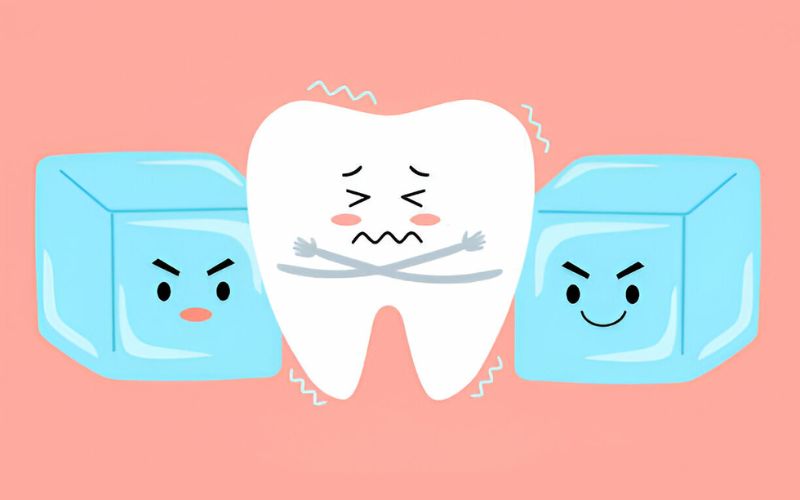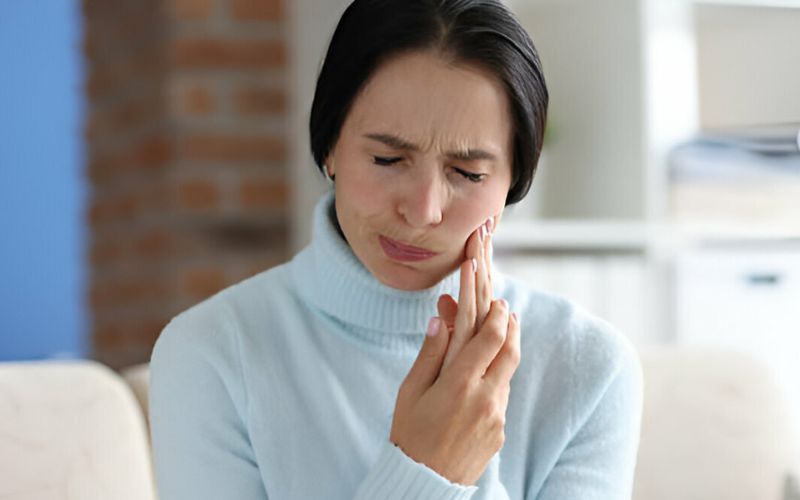Hey everyone! Sensitive teeth can turn your favorite treats into nightmares. Today, I’m sharing nine effective ways to stop sensitive teeth pain immediately. Ready for some relief? Let’s dive in!
What Causes Sensitive Teeth?
Before we tackle the pain, let’s understand why it happens. Sensitive teeth occur when the protective enamel wears down or gums recede, exposing the dentin beneath. This dentin has tiny channels that lead directly to the nerve, and when exposed to certain triggers like cold or heat, it results in that familiar sharp pain.
How to Stop Sensitive Teeth Pain Immediately – 9 Proven Methods

- Switch to Desensitizing Toothpaste: These toothpastes contain compounds like potassium nitrate that block pain signals to the nerve. It’s important to use it twice daily instead of your regular toothpaste and give it a few weeks to build up its effects. This can significantly reduce or even eliminate the pain.
- Salt Water Rinse: A simple but effective home remedy is rinsing with salt water. Mix a teaspoon of salt in a cup of warm water and swish it around your mouth for 30 seconds. This helps reduce inflammation and cleanses the area, providing temporary relief.
- Use a Soft-Bristled Toothbrush: Switching to a soft-bristled toothbrush can prevent further aggravation of your sensitive teeth. Brush gently, especially around the gum line, to avoid further erosion of enamel and receding gums.
- Avoid Acidic Foods and Drinks: Acidic substances like soda, citrus fruits, and wine can exacerbate tooth sensitivity. Minimize their consumption, and always rinse your mouth with water after consuming acidic foods to neutralize their effects.
- Fluoride Treatments: Applying fluoride can help strengthen the enamel and reduce the transmission of sensations to the nerve. You can use over-the-counter fluoride rinses or get professional fluoride treatments at your dentist’s office.
- Clove Oil Application: Clove oil is an age-old remedy for dental pain. It contains eugenol, which has natural anesthetic and antibacterial properties. Apply a small amount of clove oil to a cotton ball and dab it on the affected area. This can provide temporary relief from the pain.
- Wear a Mouth Guard: If your teeth sensitivity is due to grinding or clenching, wearing a mouth guard at night can help. This not only protects your teeth but also reduces the pressure and pain associated with grinding.
- Chew Gum (Sugar-Free): Chewing sugar-free gum can be surprisingly effective. It helps increase saliva production, which is nature’s way of remineralizing your teeth and protecting them from sensitivity.
- Thermal Protection: If extreme temperatures trigger your pain, try to avoid very hot or cold foods and beverages. Also, use a straw when drinking cold or acidic beverages to bypass your teeth and reduce exposure to triggers.
Causes of teeth sensitivity

- Enamel and Gum Protection: The primary role of your enamel and gums is to shield your teeth from harsh conditions. However, certain habits and conditions can compromise this protection.
- Hard-Bristled Toothbrushes: Using a toothbrush with hard bristles can be damaging. The stiff bristles can wear down your enamel and irritate your gums, contributing to sensitivity.
- Trapped Food Particles: Sometimes, food particles get stuck between your teeth. If they’re not effectively removed by brushing, they can continue to cause pain and increase sensitivity.
- Excessive Use of Mouthwash: Overusing mouthwash can inadvertently lead to sensitivity. Many mouthwashes contain acidic ingredients that, when used excessively, may weaken your enamel.
- Acidic Foods: Consuming foods with high acidity can also be a common culprit in causing tooth sensitivity.
- Dental Procedures: Regular dental procedures, though necessary, can also make your teeth temporarily more sensitive, especially if they are invasive or involve treating areas already prone to sensitivity.
- Dental Treatments: Treatments such as fillings and teeth whitening can leave your teeth feeling more sensitive afterward.
- Extreme Temperature Foods: Consuming foods and drinks at extreme temperatures can trigger sensitivity.
- Teeth Grinding: The habit of grinding your teeth at night, which many people may do without realizing, puts a lot of pressure on your teeth and can lead to sensitivity over time.
Ever wondered what causes gaps in teeth and want to fix them. Read our guide
When to See a Dentist
If these home remedies don’t provide relief, or if your tooth sensitivity is severe, it’s important to visit your dentist. They can identify the underlying cause of your sensitivity and recommend professional treatments such as bonding, application of dental sealants, or a root canal if necessary.
Preventive Measures
Maintain good oral hygiene by brushing twice a day with fluoride toothpaste, flossing daily, and visiting your dentist regularly. These habits can prevent the majority of issues associated with tooth sensitivity.
Conclusion
No one should have to live with the pain of sensitive teeth. Try these nine methods to find immediate relief and get back to enjoying your life without oral discomfort.